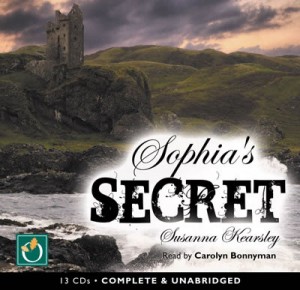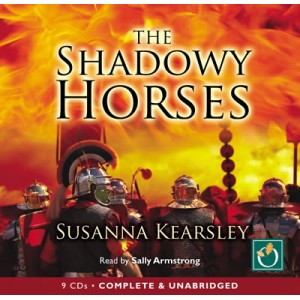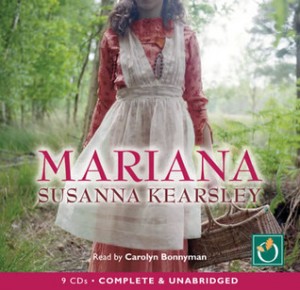Why I read it: I enjoyed The Rose Garden on audio recently and picked this one up on special from Audible.
What it’s about: (from Goodreads) From the winner of the Catherine Cookson Fiction Prize, this mesmerizing, suspenseful, and richly atmospheric tale of time travel draws us into the heart of a heroine we won’t soon forget…The first time Julia Beckett saw Greywethers she was only five, but she knew at once that it was her house. Now, twenty-five years later, by some strange chance, she has just become the new owner of the sixteenth-century Wilshire farmhouse. But Julia soon begins to suspect that more than coincidence has brought her there. As if Greywethers were a portal between worlds, she finds herself abruptly transported back in time. Stepping into seventeenth-century England, Julia becomes Mariana, a beautiful young woman struggling against danger and treachery, and battling a forbidden love for Richard de Mornay, handsome forebear of the present squire of Crofton Hall. Each time Julia travels back, she becomes more enthralled with the past, falling ever deeper in love with Richard… until one day she realizes Mariana’s life threatens to eclipse her own–and that she must find a way to lay the past to rest, or risk losing a chance for love in her own time.
What worked for me (and what didn’t): The blurb above does a fairly good job of letting you know what the book is about without revealing any massive spoilers. And there are some massive spoilers I will be avoiding – to know them early would truly spoil the impact of the book’s surprising ending.
Rather than being strictly a time-travel story, this one employs the device of reincarnation to explain events – well, mostly. Julia Beckett, present day, is the reincarnation of Mariana Farr from 16th century Restoration England. Once she moves into Greywethers, she starts experiencing strange episodes where she “becomes” Mariana, former Greywethers resident. Mariana has no awareness of Julia however and, the physical actions (walking, moving from place to place) Mariana takes, Julia mimics in the present day – so if Mariana walks from Greywethers to the river, then Julia also takes that walk – which places her in some odd situations from time to time.
Mariana moves to the country after her mother dies of plague. She lives with her Uncle Jabez Howard, a strict puritanical man and a supporter of Cromwell, his wife Caroline (and their baby son John) and her sister Rachel. Mariana meets Richard De Mornay and is instantly fascinated by him. But, she is warned by her uncle that Richard is a libertine and forbids her to have anything to do with him. Because the story swings in and out of the 16th century, there book is episodic and there isn’t a lot of Richard. The book is told from Julia/Mariana’s first person POV and that also restricts the reader’s knowledge of Richard. The book is about 11 hours long and up until about the 8 or 9 hour mark, I couldn’t have told you whether Richard was toying with a girl from a lower social station or whether he he was deeply in love. Fortunately for my romantic soul, there is enough in the latter stages of the book to satisfy me that Richard was on the side of the angels.
In the present day, Julia begins a relationship with the current lord of the manor, Geoffrey De Mornay and for much of the book, I admit to a certain frustration in the development of this relationship. Julia believes that Geoff is the current incarnation of Richard but he has no memory of it (when she eventually tells him) and he poignantly asks her if when she looks at him, she sees Richard or Geoffrey. He backs off to give her some space to work it out and is out of the picture for much of the last portion of the book. While I understood that he needed to be away so that she could go off wandering in a present day trance in his house (while Julia was Mariana in the 16th century), it limited the development of their romance. I had a feeling that the historical love story might not end on a happy note and I wanted the payoff in the present day.
Ms. Kearsley writes very much closed bedroom door. There’s not a lot of kissing and certainly no actual sex scene. I found myself wondering how far Julia and Geoff had progressed physically – there was mention of a few kisses and some dates over a period of months and I wondered about this relationship which seemed, to me, to be on the tepid side for such a great love story.
Without giving anything (more?) away, I will say this. The end section of the book, which totally surprised me, moved me and had my heart pounding has it all making sense. And I was glad.
I could have wished for more interaction with Richard – it would have been nice to be certain of his genuine love for Mariana earlier in the piece and as I’m a hero-centric reader, I did feel the lack.
What else? Carolyn Bonnyman did a wonderful job of the narration. Ian, a close friend of Geoff’s and a major secondary character in Julia’s daily life is from Scotland and her Scottish accent was just perfect. As she is British and the story is set in England, her voice had that authenticity of accent which just adds to an audiobook experience. She was able to differentiate the various accents of class but there wasn’t a lot of difference between the male and female voices and there were times I relied on the dialogue tags or wished there were more of them to make it clear who was speaking. I could have wished for a deeper “hero” voice but otherwise, her narration was pitch perfect – in terms of the pace and tone and atmosphere of the story.
I do think 1st person books work especially well on audio – perhaps there will be a post in that one day – but I think it boils down to the illusion of the narrator in the story telling you the story (as opposed to a storyteller telling a story) and there is something intimate and special about that experience I think.
I have listened to 2 Susanna Kearsley books now and I think she writes beautiful, evocative stories with a clever mix of past and present. While I don’t always understand the time travel/reincarnation thing, I’m fascinated by the idea of it and I think it makes for a great story. I’m also a fan of the idea of epic love which crosses and outlasts time. If I had my druthers, they’d have a little more of the hero and a little more heat (it doesn’t have to be erotic, but I would like some – or even a love scene) but so much else of her writing suits me so well, I feel sure that I’ll be reading and listening to many more of her books.
Grade: B+
Like this:
Like Loading...
 Why I listened to it: I borrowed a copy from a friend because mail from The Book Depository takes too long when a book is this much anticipated.
Why I listened to it: I borrowed a copy from a friend because mail from The Book Depository takes too long when a book is this much anticipated.

















